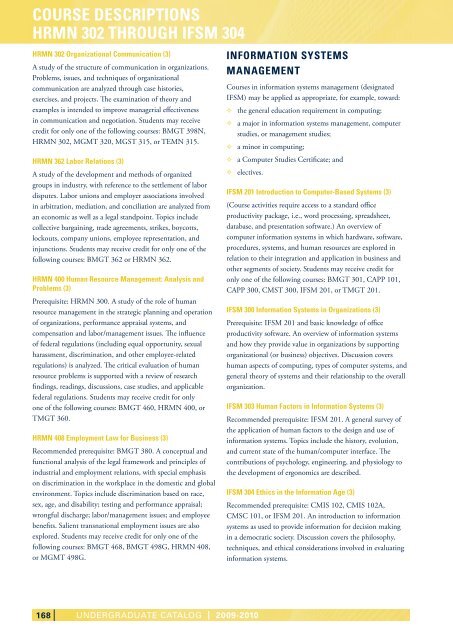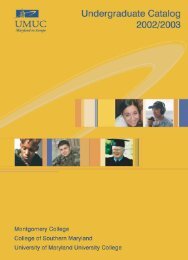UNDERGRADUATE CATALOG - UMUC Europe
UNDERGRADUATE CATALOG - UMUC Europe
UNDERGRADUATE CATALOG - UMUC Europe
You also want an ePaper? Increase the reach of your titles
YUMPU automatically turns print PDFs into web optimized ePapers that Google loves.
CouRsE dEsCRiPtions<br />
HRmn 302 tHRougH iFsm 304<br />
HRmn 302 organizational Communication (3)<br />
A study of the structure of communication in organizations.<br />
Problems, issues, and techniques of organizational<br />
communication are analyzed through case histories,<br />
exercises, and projects. The examination of theory and<br />
examples is intended to improve managerial effectiveness<br />
in communication and negotiation. Students may receive<br />
credit for only one of the following courses: BMGT 398N,<br />
HRMN 302, MGMT 320, MGST 315, or TEMN 315.<br />
HRmn 362 labor Relations (3)<br />
A study of the development and methods of organized<br />
groups in industry, with reference to the settlement of labor<br />
disputes. Labor unions and employer associations involved<br />
in arbitration, mediation, and conciliation are analyzed from<br />
an economic as well as a legal standpoint. Topics include<br />
collective bargaining, trade agreements, strikes, boycotts,<br />
lockouts, company unions, employee representation, and<br />
injunctions. Students may receive credit for only one of the<br />
following courses: BMGT 362 or HRMN 362.<br />
HRmn 400 Human Resource management: Analysis and<br />
Problems (3)<br />
Prerequisite: HRMN 300. A study of the role of human<br />
resource management in the strategic planning and operation<br />
of organizations, performance appraisal systems, and<br />
compensation and labor/management issues. The influence<br />
of federal regulations (including equal opportunity, sexual<br />
harassment, discrimination, and other employee-related<br />
regulations) is analyzed. The critical evaluation of human<br />
resource problems is supported with a review of research<br />
findings, readings, discussions, case studies, and applicable<br />
federal regulations. Students may receive credit for only<br />
one of the following courses: BMGT 460, HRMN 400, or<br />
TMGT 360.<br />
HRmn 408 Employment law for business (3)<br />
Recommended prerequisite: BMGT 380. A conceptual and<br />
functional analysis of the legal framework and principles of<br />
industrial and employment relations, with special emphasis<br />
on discrimination in the workplace in the domestic and global<br />
environment. Topics include discrimination based on race,<br />
sex, age, and disability; testing and performance appraisal;<br />
wrongful discharge; labor/management issues; and employee<br />
benefits. Salient transnational employment issues are also<br />
explored. Students may receive credit for only one of the<br />
following courses: BMGT 468, BMGT 498G, HRMN 408,<br />
or MGMT 498G.<br />
168<br />
UndERGRAdUATE CATALoG | 2009-2010<br />
inFoRmAtion systEms<br />
mAnAgEmEnt<br />
Courses in information systems management (designated<br />
IFSM) may be applied as appropriate, for example, toward:<br />
G the general education requirement in computing;<br />
G a major in information systems management, computer<br />
studies, or management studies;<br />
G a minor in computing;<br />
G a Computer Studies Certificate; and<br />
G electives.<br />
iFsm 201 introduction to Computer-based systems (3)<br />
(Course activities require access to a standard office<br />
productivity package, i.e., word processing, spreadsheet,<br />
database, and presentation software.) An overview of<br />
computer information systems in which hardware, software,<br />
procedures, systems, and human resources are explored in<br />
relation to their integration and application in business and<br />
other segments of society. Students may receive credit for<br />
only one of the following courses: BMGT 301, CAPP 101,<br />
CAPP 300, CMST 300, IFSM 201, or TMGT 201.<br />
iFsm 300 information systems in organizations (3)<br />
Prerequisite: IFSM 201 and basic knowledge of office<br />
productivity software. An overview of information systems<br />
and how they provide value in organizations by supporting<br />
organizational (or business) objectives. Discussion covers<br />
human aspects of computing, types of computer systems, and<br />
general theory of systems and their relationship to the overall<br />
organization.<br />
iFsm 303 Human Factors in information systems (3)<br />
Recommended prerequisite: IFSM 201. A general survey of<br />
the application of human factors to the design and use of<br />
information systems. Topics include the history, evolution,<br />
and current state of the human/computer interface. The<br />
contributions of psychology, engineering, and physiology to<br />
the development of ergonomics are described.<br />
iFsm 304 Ethics in the information Age (3)<br />
Recommended prerequisite: CMIS 102, CMIS 102A,<br />
CMSC 101, or IFSM 201. An introduction to information<br />
systems as used to provide information for decision making<br />
in a democratic society. Discussion covers the philosophy,<br />
techniques, and ethical considerations involved in evaluating<br />
information systems.






